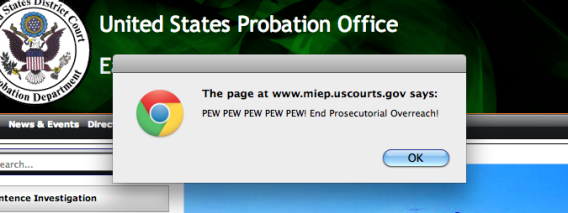As a rule, I’m not a fan of the tactics of hackers claiming affiliation with Anonymous. But as a child of the 1980s, I find it hard not to be at least a little amused by the group’s latest stunt.
As part of its ongoing protest of the U.S. government’s prosecution of computer programmer and activist Aaron Swartz, who committed suicide on Jan. 11, Anonymous this weekend hacked the website of the U.S. Sentencing Commission, www.ussc.gov. The initial hack was standard Anonymous fare, replacing the USSC homepage with a video in which a creepy computerized voice spouted pompous pseudo-revolutionary threats.
But after the site went offline and then was restored, it was infiltrated again on Sunday—and Anonymous social media accounts distributed code that turned the USSC homepage into a playable game of Asteroids. Anyone who visited the site and typed in the Konami code could use a missile-equipped Nyan Cat to blast away at the various text and graphical elements on the page, revealing a Guy Fawkes mask underneath.
When the site went down again, the hackers moved on to a different government website: that of the U.S. Probation Office for the Eastern District of Michigan. There the Asteroids hack is still live as I write this Monday morning. Typing in the Konami code brings up the following pop-up message:

Screenshot
Click OK and the Nyan Cat appears, allowing you to fire at will on the surrounding page until nothing remains but a picture of Swartz (see image at top).
I’d be hard-pressed to point to any actions Anonymous has taken against the U.S. government that have resulted in legitimate benefit to the general public. If anything, the group’s creepy, vengeful tactics give more constructive hackers like Swartz a bad name.
That said, the Asteroids hack appears to be relatively playful and benign—a far more fitting tribute to Swartz than a bunch of overblown threats to inflict “chaos” and make the Department of Justice feel “helplessness and fear,” notwithstanding the inevitable “collateral damage.” If the goal is to dissuade government officials from overly harsh crackdowns on hackers, scaring people is only going to undermine the cause.
